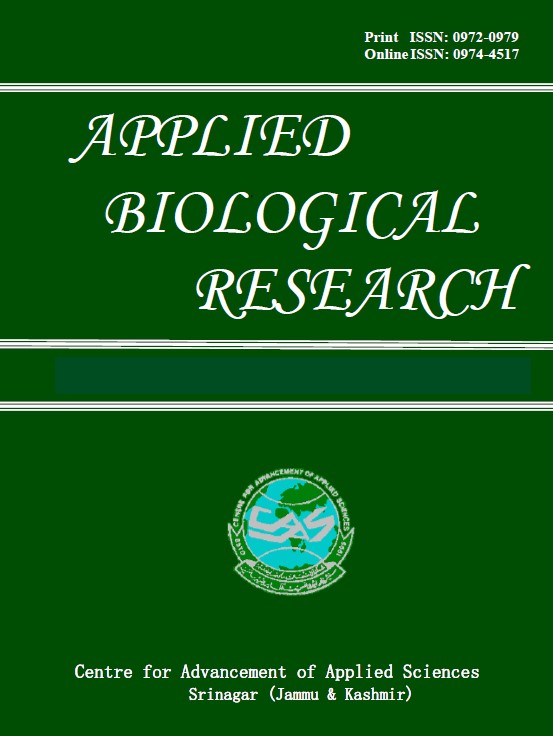Comparative Genetic Analysis Of Wild Finger Millet Accessions Using Finger Millet And Maize Microsatellite Markers
DOI:
https://doi.org/10.48165/Keywords:
Finger millet, SSR markers, genetic analysis, maize microsatellitesAbstract
The genomic information available for finger millet is very scarce though the plant is a rich source of highly digestible proteins and dietary fibre with good amounts of soluble and insoluble fractions. In present study, 64 maize and finger millet genomic SSRs were used for cross transferability, identification of polymorphic markers and genetic diversity of finger millet, both cultivated and wild species. Out of 64 SSRs, only 43 (67%) were amplified across the finger millet genotypes. The PIC values of all the polymorphic loci across the 23 finger millet genotypes varied from 0.04 to 0.47 (average value 0.17). Based on the parameters of PIC values ≥ 0.26, gene diversity ≥0.43, inbreeding coefficient ≥ 0.60, the SSR loci UGEP33, UMC1858, UMC1805, and UMC2163 were found highly polymorphic. Comparison of SSR polymorphism in finger millet genotypes revealed that microsatellites of maize were more polymorphic and were able to identify more diversity in finger millet genotypes than the finger millet SSRs. Good correlations were found between genetic diversity analysis in differentiation of finger millet genotypes using finger millet and maize microsatellite markers. Dendrogram generated through UPGMA analysis grouped all the 23 genotypes clustered them into two major groups A and B with maximum similarity found between genotype pairs T552, T622 and T507, T74. The genotype pairs T671 and T760; T187 and T 631, T824 showed lowest similarity in finger millet which could be selected for hybrid plant production. The present study enriched the finger millet genomics by identifying suitable polymorphic markers of maize and finger millet, which can be used for diversity analysis, cultivar identification and QTL mapping studies.
Downloads
References
Babu, B.K., Senthil. N., Michael Gomez, S., Biji, K.R., Rajendraprasad, N.S., Satheesh Kumar, S. and Chandra Babu, R. 2007. Assessment of genetic diversity among finger millet (Eleusine coracana (L.) Gaertn.) accessions using molecular markers. Genetic Resources and Crop Evolution, 54: 399-404.
Babu, B.K., Agrawal, P.K., Dinesh Pandey, Jaiswal, J.P. and Anil Kumar. 2014a. Association mapping of agro-morphological characters among the global collection of finger millet genotypes using genomic SSR markers. Molecular Biology Reports, 41: 5287-5297.
Babu, B.K., Agrawal, P.K., Dinesh Pandey, and Anil Kumar. 2014c. Comparative genomics and association mapping approaches for opaque2 modifier genes in finger millet accessions using genic, genomic and candidate gene based SSR markers. Molecular Breeding, 34: 1261-1279.
Comparative genetic analysis of finger millet accessions 17
Babu, B.K., Pandey Dinesh, Agrawal, P.K., Sood, S., Chandrashekara, C., Bhatt, J.C. and Anil Kumar. 2014b. Comparative genomics and association mapping approaches for blast resistant genes in finger millet using SSRs. PLoS ONE, 9(6): e99182. doi:10.1371/journal.pone.0099182.
Bharathi, A. 2011. Phenotypic and Genotypic Diversity of Global Finger Millet (Eleusine coracana (L.) Gaertn.) Composite Collection. PhD thesis, Tamil Nadu Agricultural University, Coimbatore, India.
Dida, M.M., Srinivasachary, R.S., Bennetzen, J.L., Gale, M.D. and Devos, K.M. 2007. The genetic map of finger millet, Eleusine coracana. Theoretical and Applied Genetics, 114: 321-332. Dida, M.M., Wanyera, N., Harrison Dunn, M.L.N., Bennetzen, J.L. and Devos, K.M. 2008. Population structure and diversity in finger millet (Eleusine coracana) germplasm. Tropical Plant Biology, doi:10. 1007/s12042-008-9012-3
Dje, Y., Heuertz, M., Levfebvre, C. and Vekemans, X. 2000. Assessment of genetic diversity within and among germplasm accessions in cultivated sorghum using microsatellite markers. Theoretical and Applied Genetics, 100: 918-925.
Kumar, A., Sharma, N., Panwar, P. and Gupta, A.K. 2013. Use of SSR, RAPD markers and protein profiles based analysis to differentiate Eleusine coracana genotypes differing in their protein content. Molecular Biology Reports, 39: 4949-4960.
Kumari, K., Muthamilarasan, M., Misra, G., Gupta, S. and Subramanian, A. 2013. Development of eSSR-Markers in Setaria italica and their applicability in studying genetic diversity, cross transferability and comparative mapping in millet and non-millet species. PLoS ONE, 8(6): e67742. doi: 10.1371/journal.pone.0067742.
Liu, K. and Muse, M. 2005. Power Marker: An integrated analysis environment for genetic marker analysis. Bioinformatics, 21: 2128-2129.
Maniatis, T., Sambrook, J. and Fritsch, E.F. 1989. Molecular Cloning: A Laboratory Manual (2nd edn.). Cold Spring Harbor Laboratory Press, Cold Spring Harbor, USA.
Murray, M.G. and Thompson, W.F. 1980. Rapid isolation of high molecular weight plant DNA. Nucleic Acids Research, 8: 4321-4326.
Nirgude, M., Kalyana Babu, B., Shambhavi, Y., Singh, U.M., Upadhyaya, H.D. and Anil Kumar. 2014. Development and molecular characterization of genic molecular markers for grain protein and calcium content in finger millet (Eleusine coracana (L.) Gaertn.). Molecular Biology Reports, 41: 1189-1200.
Rajput, S.G., Tammy, P.H. and Dipak, K.S. 2014. Development and characterization of SSR markers in Proso millet based on switchgrass genomics. American Journal of Plant Science, 5: 175-186.
Shambhavi, Y., Vikram Singh, G., Jaiswal, J.P. and Anil Kumar. 2014. Simple sequence repeat (SSR) analysis in relation to calcium transport and signaling genes reveals transferability among grasses and a conserved behavior within finger millet genotypes. Plant Systematics and Evolution, 300: 1561-1568.
Udupa, S.M. and Baum, M. 2001. High mutation rate and mutational bias at (TAA)n microsatellite loci of chickpea (Cicer arietinum L.). Molecular Genetics Genomics, 265: 1097-1103. Yadav, O.P., Mitchell, S.E., Fulton, T.M. and Kresovich, S. 2008. Transferring molecular markers
from sorghum, rice and other cereals to pearl millet and identifying polymorphic markers. Journal of SAT Agricultural Research, 6. 1-4.

